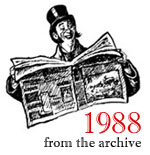
New South, Old Religion
SUN-BELT PARADOXES & EXCESSES
Back in the old days, before the sunbeltization of the South, Yankees ventured into Dixie with trepidation. Speeding through the former Confederacy on their way to Florida, they peered out of their fancy automobiles at a people and a landscape filled with minatory portents. Those ragged Negroes, slack-jawed rednecks, scraggly hound dogs, battered pickup trucks, fetid swamps, and languid muddy rivers sent a prickling of fear crawling up the Yankee spine. It was all so — well, Faulknerian. Beneath its sluggish and placid surface it seethed with the exotic and dreadful: violence, insanity, imbecility, incest, miscegenation. When it involved the South, the Yankee’s legendary realism and sangfroid succumbed to the phantasmal.
That has changed. The South, once condemned as a stagnant backwater — an embarrassment to wholesome, energetic Americans — has undergone a metamorphosis in the American mind. The image of the Sun Belt has crowded out the phantasmagoria of the past. Tobacco Road has been transformed into an Atlanta suburb, newly rechristened “Tara Estates”; Jeeter Lester’s grandson — J. Lester III — commutes by BMW to his brokerage firm on Peachtree Street. Bustling entrepreneurs have shouldered aside the fabled Good Ole Boy — he of tobacco-wad, beer can, pickup truck, and shotgun. Formerly wedded to the past, the South pulsates with progress and scintillant visions of the future. Once not fully American, it embodies the quintessence of Americanism. The Yankee no longer experiences the old surge of fear and revulsion as he races toward Florida; instead he mulls the possibility of abandoning a decrepit North to try his luck in Dixie. In the late 20th century, the South is, as they say in the boardrooms and promethean glass towers, where the action is.
Imagine a Northern friend (yes, “friend”: the war is over and he exudes amiability) on a leisurely foray into the South. He has crossed its borders this time without Florida as destination; he comes as a prospective migrant. Business has slumped in his native Pennsylvania, and he is pondering a relocation to Nashville, a city that burbles with Sun-Belt vigor. He spends Saturday in an unhurried drive down the Shenandoah Valley on Interstate 81. The Virginia landscape at its most ravishing unfolds before him as he consumes the miles from Winchester southward. Late in the afternoon he exits at Bristol on the Tennessee border, checks into a sparkling Sheraton Inn (spiffier than the superannuated one at home), and relaxes over a sumptuous meal at a well-appointed steakhouse (no grits or red-eye gravy on this menu). Back in his hotel room he retires to a night of easeful sleep. As he drifts off he hums “Dixie” and dreams of the dollars that sprout as thick in the Southland as tobacco and cotton once did.
The next morning he continues toward Nashville, a five-hour drive across east Tennessee. He reaches for the radio knob, seeking music to complement his expansive mood. The soporific hum of motor and tire yields to a choir singing “What a Friend We Have in Jesus.” The Northerner smiles, “Why, it’s Sunday morning!”
You May Also Enjoy
John Paul II wrote of political superpowers that all-consuming pursuit of profit and power are “forms of modern imperialism” and “real forms of idolatry.”
If interreligious connectedness is not recognized and cherished at a time when religion itself is imperiled, we are in a bad way.
If the world was converted once, it can be converted again. The first time, only twelve Apostles and their disciples bravely managed to plant the seeds.

